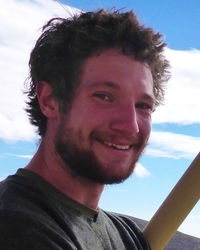
Daniel Nathan Scott
Bachelor Of Science - Earth And Space Sciences
Class of 2013
Cum Laude
What made you decide to get into geosciences?
I've loved to rock climb since I was a child, and I've always felt a strong connection to the processes that occur on Earth's surface. I love being able to work and learn in the same places that I play, so geomorphology was an immediate draw to me after entering the department. When I'm in the mountains, there's always so much going on in terms of the movement of rock. I feel that many climbers develop an intuitive feel for how those processes work and on what timescales they operate. My decision to become a geomorphologist was a way of satisfying the deep curiosity I've developed through spending my life in the mountains. It's a wonderful experience to be able to ask meaningful questions about the places I love, then have the skills to be able to seek an answer to those questions.
What was your favorite part of the ESS department?
I really enjoyed the cohesive nature of our department. I felt that I had a good support network of people in the department--not just undergraduates, but graduate students and professors as well--who I could turn to for help at any time. The ESS department is structured in a thoughtful way that limits students only by their own motivation; there is so much opportunity to pursue independent research and gain extracurricular experience in the field. I cannot overstate how important it was to my current research and my career that I was able to do research as an undergraduate. Many departments will employ undergraduates to do lab work or act as field assistants, but I had the unique opportunity to design and execute my own research projects as an undergraduate, with the support of professors who really cared about my education and development as a researcher.
What are you doing now?
I'm currently pursuing my MS and PhD at Colorado State University with Dr. Ellen Wohl.
In short, I am doing field-based research with the goals of better understanding mountainous geomorphology and improving our management of the Earth's surface. I've been teaching undergraduate geology courses and helping to redesign the courses I've taught to be more applicable to modern geomorphic field methods and utilize contemporary pedagogical knowledge.
Any advice for our current students?
Do not hesitate to break out of the mold of just taking classes. Regardless of your intended career path post-graduation, the experiences you have outside of classes (e.g., helping graduate students with research, doing your own research, working in one of the many labs on campus, doing community outreach) will help you narrow down your career path while you're still an undergraduate and have the leeway to experiment. Not to mention, if you intend to stay in the geosciences after graduating (and don't think that you absolutely have to do that--you do whatever makes you happy), research experience, exposure to geologic methods, or outreach will give you a huge leg up on all the other people with whom you will inevitably compete.
At the same time, don't forget that geology is the study of processes and forms that either occur or manifest in areas that are (usually) accessible by humans. Get outside and experience the geology you study. It's very important to gain a conceptual and (hopefully) field-based understanding of the Earth.





